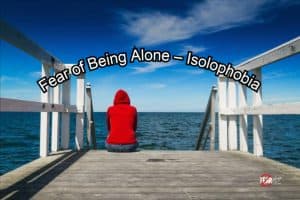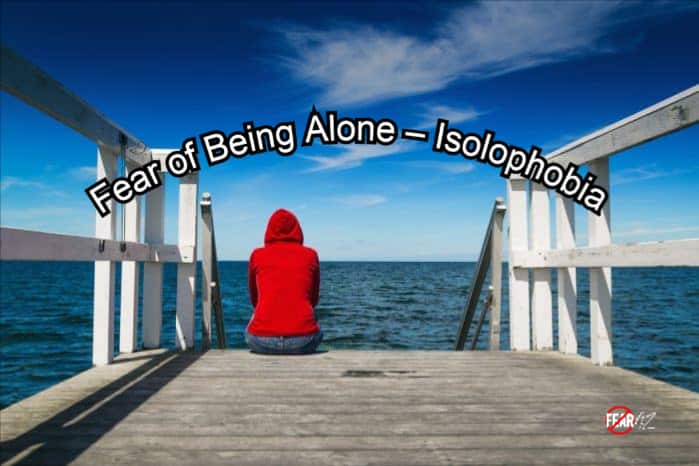Share This Article
Isolophobia or the Fear of Being Alone: A Guide
We all know that one is the loneliest number, but is that really a phobia?
The short answer is yes. The Phobia of Being Alone is an actual excessive fear that affects millions worldwide.
Do you start to sweat or panic at the thought of being left alone for more than a few hours? Do you need to be around others and when you’re not is your mood altered significantly?
What is the fear of being alone? The technical name is isolophobia. So if being alone too long causes you physical or mental strain, you may indeed suffer from isolophobia. Read on to discover more.
Other names for isolophobia?
Eremophobia, Monophobia and Autophobia
The first step in learning how to overcome fear of being alone is understanding why it afflicts you.
Isolophobia is a recognized psychological condition that involves the fear of being alone.
That said, there is a difference between a basic fear of being alone and isolophobia. A fear of being alone may apply in a broad sense to any number of conditions. It is also quite common. According to at least one survey published in HuffPost in 2014, as many as one in three US adults reported being afraid of being alone.
However, the manner in which they articulated that fear was still fairly generalized and not in keeping with the clinical definition of isolophobia.

So, what does it mean to have clinical isolophobia, and what can you do about it?
What Is Isolophobia?
As you might have guessed from the name, isolophobia—otherwise known as monophobia—is the clinical name for the fear of being alone. The names give away something of the nature of this fear, with iso for “isolation” and mono designating “self” or “single.”
When you suffer from a clinical fear of being alone, you typically feel some mixture of isolation. You may feel singled out or different from others, or fear that you will be ignored, left behind, or left alone.
However, there is more to it than that. Isolophobia may include a fear of being alone not just through social isolation, but also because of fears of what might happen to you while alone. You might obsess about intruders, burglars, or other such catastrophic events.
Other feelings associated with isolophobia include:
- fear of being alone with strangers
- fear of being alone forever because you are “unwanted” or “unloved”
- fear of isolation
- fear of being alone at night/fear of being alone in the dark/afraid of the dark
- fear of being cut off from others due to a sudden medical condition
- the sensation of hearing unexplained noises and worrying about them
Causes of Isolophobia
Part of what makes isolophobia difficult to deal with is that its precise cause is still unknown.
Even so, there are certain triggers and causes that are characteristic of isolophobia, beginning with the perception that a lack of human companionship is a terrifying circumstance. The familiar is often comforting for those suffering from a psychological condition or phobia, and isolophobia is no exception. The familiarity of other people can be soothing, while the absence of it can be alarming.
It is important to note that isolophobia is strictly a phobic mental health condition, meaning that it is not usually caused by underlying medical factors. That doesn’t mean the phobia isn’t “real,” but rather that it typically doesn’t have a physical component.
Even when sufferers of isolophobia know that their condition is strictly mental, they often cannot control their symptoms.
One hypothesis for the formation of this phobia has to do with past traumatic events relating to abandonment. Perhaps your parents got a divorce, you were left alone for too long, you weren’t given enough attention, or you otherwise felt “abandoned” as a child. Those feelings may persist into adulthood in the form of separation anxiety and isolophobia.
Symptoms of Isolophobia
How do you know if you have isolophobia?
Some of the most common symptoms of isolophobia include:
- worrying about being alone to the point of obsession
- constantly thinking about being alone
- feeling as though you have no one in the world to help you
- imagining nightmare scenarios of things happening to you while you’re alone
- having a sense of detachment from your body while alone
- shaking
- sweating
- dizziness
- chest pains or heart palpitations
- hyperventilation
- nausea
- anxiety
- dread at the idea of finding yourself alone
- a strong desire to flee an area when you find yourself alone
- anticipating being lonely
- being afraid that an intruder may break in
- feeling like you might faint
- feeling like you might die
Needless to say, these symptoms are varied. Most symptoms could also be attributed to other conditions. As such, you’ll want to consult with a licensed psychologist, who will be able to review your situation in context and determine if isolophobia is indeed the culprit.
Diagnosing Isolophobia
Isolophobia is considered a situational phobia. That means your particular situation can further exacerbate the condition. If you find yourself in a position where you are alone or feel ignored, you may inadvertently trigger symptoms.
Your situation definitely plays a role in determining whether you have a fear of being alone, and if so, what can be done about it.
Treating and Living with Isolophobia
One of the most important things to recognize about a fear such as isolophobia is that it is indeed a valid psychological phobia. You aren’t just imagining it or making things up to be melodramatic. And it isn’t your fault. All of that may seem obvious, but far too often we shame people for their psychological conditions, especially phobias such as a fear of being alone.
When it comes to the fear of being alone phobia, recognition and treatment is critical.
Thankfully, when it comes to managing a fear of being alone, you have several options.
One of the most important things to do is to put your phobia into context. Remember, this fear of being alone is situational. That means it can change. An isolated or lonely past does not have to dictate your entire life.
When learning how to get over the fear of being alone, it may be helpful to practice cognitive behavioral therapy (CBT). CBT works by rewiring your brain’s associations with certain words and ideas, and helping you reprogram your mind around certain patterns to reach a healthier way of thinking and living. This is a very effective method. According to the National Institute of Mental Health, around 75 percent of patients with specific phobias see progress with CBT.
Also potentially helpful is exposure therapy, which involves careful, controlled exposure to potential triggers of a given phobia. For isolophobia, this can involve safe, controlled periods of isolation, allowing patients to see that there is nothing to fear by being on their own.
Finally, there are medication options. Beta-blockers, which work to impair the effects of adrenaline on the body, may help calm a patient. The same may be said of benzodiazepines, which can reduce anxiety by acting as a sedative.
However, in most cases, doctors avoid prescribing medication for isolophobia because of the addictive properties of these drugs. The fear of being alone is a situational condition, and is often best managed by dealing directly with the situation. Medication is only prescribed in the most serious of cases.
By its very nature, isolophobia may leave you feeling isolated and alone. However, you are anything but. There is an entire community ready to help you. All you have to do is reach out.




